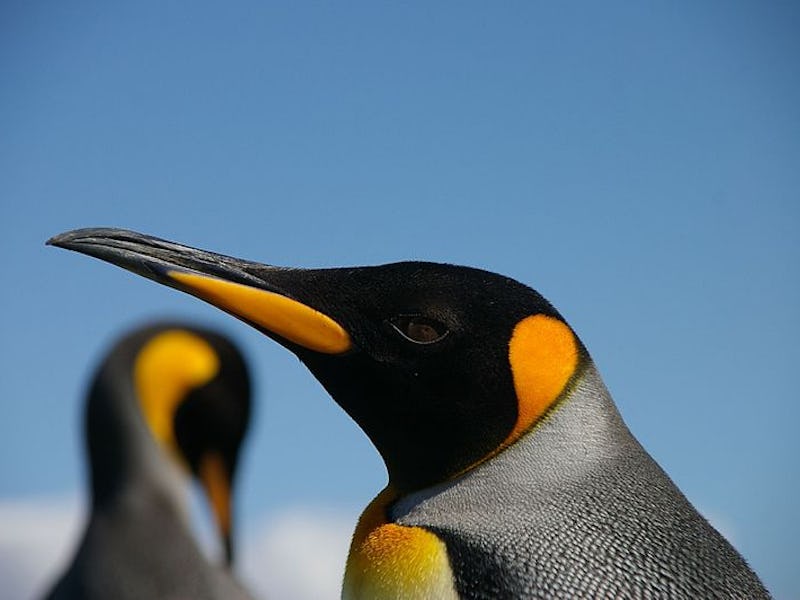Get Ready to Say Goodbye to Earth's Beloved King Penguins
1.1 million breeding pairs of penguins are under threat.

The first step most species take to avoid the effects of rapid climate change is to change their location. For animals that thrive in the cold, that means shifting to a different latitude or elevation. But king penguins, who breed exclusively on ice-free islands in the Southern Ocean and only eat fish that follow the Antarctic Polar Front, don’t have that luxury. Warming waters have driven their food to move to colder regions southward, resulting in a wide distance between where they live and where they hunt.
This is very bad news for king penguins. According to research published Monday in Nature Climate Change by a team of international scientists, seventy percent of king penguins will relocate or disappear before the end of the century if greenhouse gas emissions continue at present rates. That’s 1.1 million breeding pairs of penguins sidelined by climate change disrupting an already fragmented ecosystem.
King penguins, in particular, shift breeding grounds in a “stepping-stone manner,” meaning that they jump from island to island, searching for the climate they require to breed. Seeing as they inhabit only islands in the frigid Southern ocean that are ice-free year round, these islands are quite rare. When the penguins do manage to find these islands, they are often quite far away from their natural foraging grounds, and the longer foraging trips that result mean they must use up more energy to find food. When there isn’t enough nutrition available, this can be fatal — and in turn lead to an overall decline in penguin populations.
King penguins in the Falkland Islands.
The researchers’ predictions are based on a biophysical ecological niche model that incorporates population dynamics and genomics to simulate how the the penguin will shift its habitat in the coming years and how other regions will become vulnerable to climate change.
“The continuous poleward displacement of the species’ foraging grounds, combined with the discrete distribution of its breeding locations, implies that king penguin populations must undergo abrupt location shifts from island to island to follow their habitat,” the researchers write.
“While a poleward range shift is the predicted response to climate warming for cold-adapted species, the highly fragmented nature of the king penguins habitat precludes continuous population displacement.”
King penguins in Fortuna Bay.
The model predicts that 49 percent of the king penguins that breed on the Crozet and Prince Edward Islands will completely lose their habitat, while 21 percent of king penguins — namely those that breed on the Kerguelen, Falkland, and Tierra del Fuego islands — will experience strongly altered habitats because of the increased distance to their foraging grounds. The colonies that are least likely to be affected are those who live on the Bouvet, Heard, and South Georgia islands.
While king penguins aren’t expected to become extinct in the near future, they’re currently labeled as a species of “least concern,” this study indicates climate change will have a cascading effect — as the fish king penguins eat move closer to the South Pole, the distances the penguins will need to swim from their ice-free islands will become larger. They’ll either need to find new islands that will allow them to swim those lengths, or they’ll face a scary future.
What humans can do to restrain this effect is curb greenhouse gas emissions, which are created by the burning fossils fuels like coal, natural gas, and oil.